
Hong Kong flavour:
Fredric Mao interspersed modern songs and Western music with Cantonese opera music in his new production, “The Liaisons”.

Emotional journey:
The romance and enduring love depicted in "The Legend of the Purple Hairpin"
contrasts with modern life, which stresses efficiency.
Scripting HK’s dramatic future
January 11, 2012
Local drama director Fredric Mao has devoted most of his career to injecting a unique Hong Kong flavour into his productions. He joined the Hong Kong Academy for Performing Arts’s School of Drama as Head of Acting when it was established in 1985, and helped train a new generation of local talent. From 2001 to 2008, he was Artistic Director of the Hong Kong Repertory Theatre. His productions won kudos not just from a local audience, but also when they toured Mainland China and abroad.
Mao’s latest work, “The Liaisons”, builds on his success. The contemporary romance interwoven with traditional characters of Cantonese opera classic "The Legend of the Purple Hairpin" interprets the romance and enduring love depicted in the classic in a modern context.
“I am very familiar with the traditional Chinese theatre and Chinese opera,” Mao told news.gov.hk. “I always have a very strong interest to utilise the Chinese traditional opera in my work.”
New ideas, higher risks
The performance intersperses modern songs and Western music with Cantonese opera music, to showcase the uniqueness of Hong Kong theatre. Mao said it was difficult work, that took a year to research, prepare the script and find creative partners and performers.
New ideas attract higher risks. Unsure whether the audience would accept such a novel performance, Mao took the chance to premiere it during the 2010 Hong Kong Arts Festival.
“I think this is a perfect platform to present a new work and work with a certain scale and with a certain demand of quality and production. The Hong Kong Arts Festival is actually a very ideal place because it is an icon itself in Hong Kong,” he said.
Cultural exchange
The work received critical acclaim, and with government sponsorship , Mao and his team co-operated with the festival again, to bring the production to the Shanghai Expo as a highlight of Hong Kong’s cultural programme.
“It was surprisingly popular. The reason is that this production is all in Cantonese. For most of them [Shanghai audience], it was the first time to see or hear something like the Cantonese opera. But because of the new treatment in this production, the audience loved it,” Mao said.
He was then invited to stage the show in Beijing and Shenzhen, sponsored by the Home Affairs Bureau’s Arts Development Fund’s Cultural Exchange Project.
Performance focused
Other government schemes are also available to support drama groups’ finance, administration, venue arrangements and production. Mr Mao said this can relieve artists’ pressure, allowing them to focus on their performance.
“That is very important. If we are doing things that are valuable, then we have to try to find the means to support them, and that is very important for the art work, for the development of art in Hong Kong,” Mao said.
He believes “practice makes perfect” and is key to success. Mao noted the Cantonese operas
“The Princess Changping” and
"The Legend of the Purple Hairpin", became “classics” only after decades of repeated performances.
Subsidies precipitate classics
The drama industry also needs more “classics”, he says, and government subsidies can help precipitate them. With financial support, a theatre company can travel abroad and have contact with audiences from different backgrounds, with different demands. In the process, the production can be adapted and polished.
Mao is optimistic about the creative industry’s future in Hong Kong, especially with the pending West Kowloon Cultural District Project.
“We must believe that when we have that kind of environment, that kind of hardware that is being established, we should feel encouraged to work on our software and to meet the needs. I hope when we have the West Kowloon [Cultural District], the theatre will be filled by our own work of Hong Kong,” Mao said.